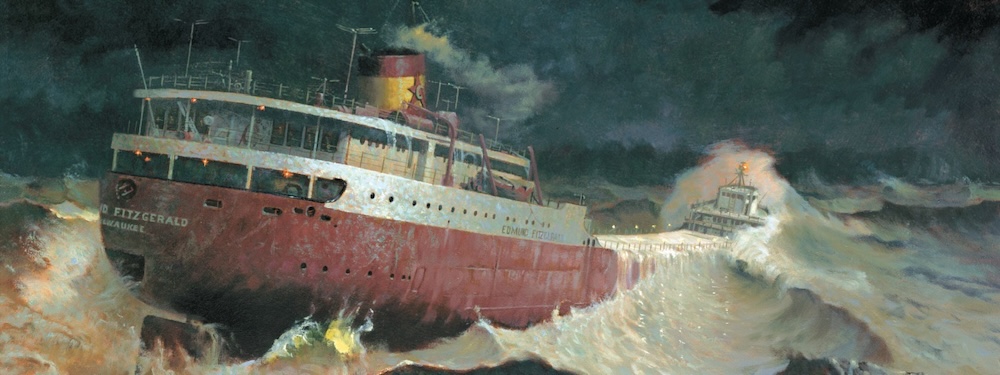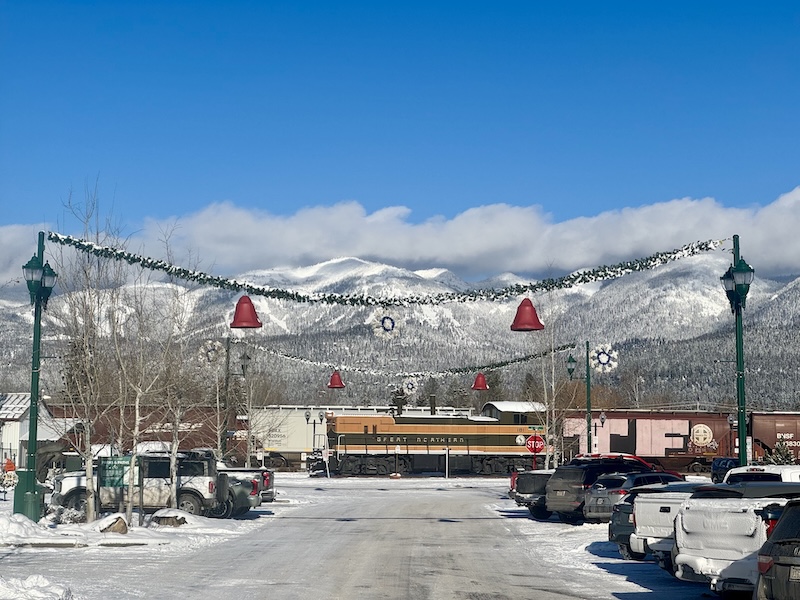
To help me pass my recovery-from-surgery time, my friend Spiff loaned me a book, “The Gales of November.” (By the way, “Spiff” is a perfect nickname for this friend because he really is a very spiffy guy!) The subtitle of this book is “The Untold Story of the Edmund Fitzgerald,” the Great Lakes freighter that sunk in Lake Superior in November 1975 and has since been immortalized by Gordon Lightfoot’s song. It’s not a book I would have chosen for myself, but boy, am I glad Spiff loaned it to me because it is both a detailed examination of an overlooked American way of life, as well as a riveting account of an unspeakable human tragedy. If you’re in search of a good read, I give John U. Bacon’s book two thumbs up!
I learned a lot by reading “The Gales of November:” the mining and marine transport of taconite (iron ore pellets); life on a Great Lakes freighter and in its various ports of call; the squeeze of the “Soo” Locks, and the lives of all the brave Great Lakes sailors who manned the “Fitz.” And about the Plimsoll Line. I’d never heard of it before, but now I can’t stop thinking about it.
Samuel Plimsoll was a 19th Century British politician, a member of the House of Commons, who was sympathetic to the plight of workers and the poor. He was particularly concerned about seamen who toiled aboard British “coffin ships,” overloaded and unsafe cargo vessels that sent many sailors to a watery grave. Ship owners were aware of the problems, but turned a blind eye to them by taking advantage of a new growth industry—insurance. Instead of improving working conditions aboard their compromised vessels, owners took out huge insurance policies on these vessels—in Mr. Bacon’s words, making “a cynical bet against the lives of their helpless crews.” If a ship arrived safely in port, the owners would turn a tidy profit. If their vessel sank on route, the insurance payout was exponentially more.
Plimsoll set out to change that calculus but his attempts to pass new regulations were repeatedly foiled by colleagues in Parliament who had financial interests in the shipping industry. But slowly, public opinion began to side with Mr. Plimsoll and in 1867, Parliament passed the Marine Shipping Act which, among things, required ship owners to paint a line on the port and starboard sides of their vessels to indicate how far down a fully loaded ship could sit in the water and still sail safely. Today, that line— the “Plimsoll Line”— is the law in virtually every seafaring nation.
So, tell me: where is America’s Plimsoll Line these dreary days? It seems to me we are sinking ever lower and lower in the water and it won’t be long until we’re overloaded and unfit to sail. Overloaded ships are unsafe in heavy seas, but an overloaded nation is a global disaster waiting to happen. If our ship of state sinks, we’ll all go down with it.
Greed was the motivation of the ship owners in Samuel Plimsoll’s day. Greed and unchecked political power are its contemporary counterparts. When I watch the news now and see the horrific images of masked ICE agents shooting innocent citizens, or hear the odious lies coming from the White House, or from other federal agencies, or even congressional hearings, I can’t help but wonder if we aren’t already well below our political Plimsoll Line. It’s November, the gales are blowing, and we’re foundering.
The next time you see one of those giant cargo ships or enormous freighters out on the Bay, look for its Plimsoll Line. I assure you it’s there. Where is ours?
I’ll be right back.
Jamie Kirkpatrick is a writer and photographer who lives on both sides of the Chesapeake Bay. His editorials and reviews have appeared in the Washington Post, the Baltimore Sun, the Philadelphia Inquirer, the Pittsburgh Post-Gazette, the Washington College Alumni Magazine, and American Cowboy Magazine. His most recent novel, “The Tales of Bismuth; Dispatches from Palestine, 1945-1948” explores the origins of the Arab-Israeli conflict. It is available on Amazon and in local bookstores. His newest novel, “The People Game,” is scheduled for publication later this month, but it’s available for pre-order now on Amazon and other platforms. His website is musingjamie.net.








 I was upstairs folding laundry when I heard a knock at the front door. It doesn’t take much to make me forget about folding laundry so I headed downstairs to see who was here. It was my friend Tom, owner of our local bookstore. He had a young man with him. Tom introduced us: “Jamie! This is Jacob. He’s just back from the Peace Corps. You two should talk!” and with a cheery wave of his hand, Tom was gone.
I was upstairs folding laundry when I heard a knock at the front door. It doesn’t take much to make me forget about folding laundry so I headed downstairs to see who was here. It was my friend Tom, owner of our local bookstore. He had a young man with him. Tom introduced us: “Jamie! This is Jacob. He’s just back from the Peace Corps. You two should talk!” and with a cheery wave of his hand, Tom was gone.